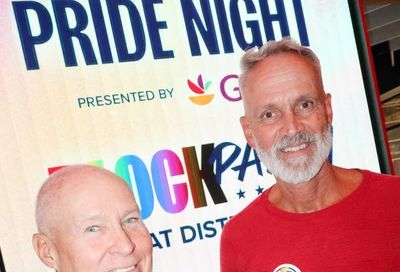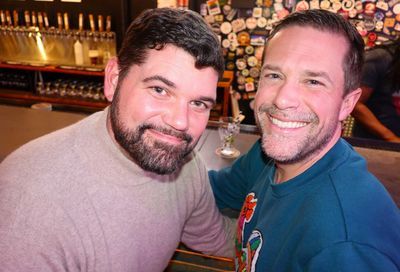Creative Calculations
Mathematics professor Manil Suri introduces a gay theme with his third Mumbai tale
The first lines of The City of Devi detail the character Sarita haggling over the price of a pomegranate. That might seem relatively insignificant, except that the price has risen dramatically in light of the impending apocalypse – a bomb due to incinerate the city. In this case, Mumbai. Or Bombay, depending on your preference.
Adding more layers are the author’s interests. Manil Suri loves Mumbai, his hometown. The haggling and the doomsday countdown touch upon Suri’s position as a professor of mathematics at the University of Maryland, Baltimore County, putting that Ph.D. in applied mathematics to good use. As for the pomegranate, well, Suri is no slouch in the kitchen, either.

Manil Suri
(Photo by Nina Subin)
”I had one recipe that was published,” says the charmingly soft-spoken, Silver Spring-based Suri. ”I wrote an article on food for The New York Times Magazine and I came up with this dish that was a sort of Indian version of coq au vin. So it had all the chicken and the wine and everything. Then it had these Indian spices in it, too. It really makes a completely different dish. The key ingredient is star anise. It just gives all the wine and chicken a different flavor. I call it ‘murgh au vin,’ because ‘murgh’ is the word for chicken in Hindi.”
Obviously, there is a creative spark in Suri that burns brightly. The world got a taste of that spark with his first novel, 2001’s The Death of Vishnu. He followed that in 2008 with The Age of Shiva. Now, it’s Devi’s turn.
”I kind of wandered into this whole idea of using the names of Hindu gods in the titles of these books,” Suri explains. ”In the first book, there was an actual man named Vishnu who was dying in the building in which I grew up. He used to live on the steps. I started writing a story about it, because while I was there he actually died on the steps. I took a class at the Writer’s Center in Bethesda, and the instructor said, ‘You can’t name your character Vishnu and not tie it to the Hindu god. It’s a very loaded name.’
”That’s when I started thinking of the little analogies. This guy takes care of little errands in the building, and the god Vishnu is supposed to take care of making the universe go round. So, from that, Vishnu went into the title. Then I started thinking this could be a trilogy, because there are three gods – Vishnu, Shiva and Brahma – who are the creators. By the time I got to the third novel, Brahma had changed into the mother goddess, Devi, who seemed to be a better choice in terms of the theme I was developing. She’s sort of the patron goddess of the city of Bombay. And also because she’s more worshipped. Those motifs are very much in the background. The books are really about India, and Bombay in particular. They form a nice trilogy in the sense that the first one is about the city in contemporary times, and the second one looks at the past, and the new one really takes the story into the future. It’s not the same story – it’s three panels of the city and the country.”
Another change for this new work is the introduction of a gay theme. The aforementioned Sarita is heading out into the chaos of a city at war to find her husband, Karun. So is his male lover, Jaz.
The gay turn, says Suri, has not been much of a shock in India. Traveling there earlier this year, with is partner of 23 years, Suri read to receptive audiences.
”The week I landed in Bombay, there was a whole issue on queer Mumbai put out by Time Out Mumbai,” he recalls. ”No one really had any negative reaction. It almost got to the point where I said, ‘What is going on? Are people being blasé about this? Showing how hip they are? Or have attitudes really changed that much?’
”I think part of it, especially in India, is because two or three years ago there was a high court ruling that struck down the anti-sodomy laws. Since then, there’s been a lot of discussion of this in the media. So people are finally getting to hear about it. And they’re sort of just shrugging it off, because there’s so much diversity in India already. This is like one more quirk. It’s just not been a big deal there, so far. I’m hoping that will continue.”
Suri is also hoping the writing will continue – as well as the math. After the success of The Death of Vishnu, he left mathematics to concentrate on writing. He says that switch actually left him somewhat ungrounded, prompting him to return to teaching. Blending the two, Suri says an e-book he’s working on will deal with math more directly, which he thoroughly enjoys.
As he explains his writing process, it seems the creative and the calculating are never too far apart.
”You kind of need both,” he says. ”There’s a burst of emotional energy; let’s imbue the characters with these feelings. And then there is the more mathematical sort of thinking, looking at the structure of the story. Where is it going? What are the possible options? And then picking one of them, sort of cold-bloodedly almost.”
Suri is comfortable with a suggested analogy of smashing atoms and then looking at the data.
To that, he adds, ”Emotion can only carry you so far. After that, if you just let it go loose, it will be muddy, self-indulgent. You have to keep reining it back in.”
For those aspiring writers at OutWrite, that’s just a taste of the advice Suri may have to offer. Perhaps more importantly, he would advise simply coming to the book fair to be inspired by community. As an attendee of a former iteration of OutWrite, held in Boston in 1999, that certainly aided him.
”What really helped me was being able to work on my craft with a very supportive group of likeminded writers,” he shares. ”I think so many of these issues, especially we as gay people would face, it’s necessary to work through them, and writing is a great way of doing it. It also helps you realize which parts of your story might be promising as fiction.”
Manil Suri reads from The City of Devi as part of the OutWrite LGBT Book Fair Saturday, Aug. 3, at 7:30 p.m., at the Reeves Center, 2000 14th St. NW.

Support Metro Weekly’s Journalism
These are challenging times for news organizations. And yet it’s crucial we stay active and provide vital resources and information to both our local readers and the world. So won’t you please take a moment and consider supporting Metro Weekly with a membership? For as little as $5 a month, you can help ensure Metro Weekly magazine and MetroWeekly.com remain free, viable resources as we provide the best, most diverse, culturally-resonant LGBTQ coverage in both the D.C. region and around the world. Memberships come with exclusive perks and discounts, your own personal digital delivery of each week’s magazine (and an archive), access to our Member's Lounge when it launches this fall, and exclusive members-only items like Metro Weekly Membership Mugs and Tote Bags! Check out all our membership levels here and please join us today!



















